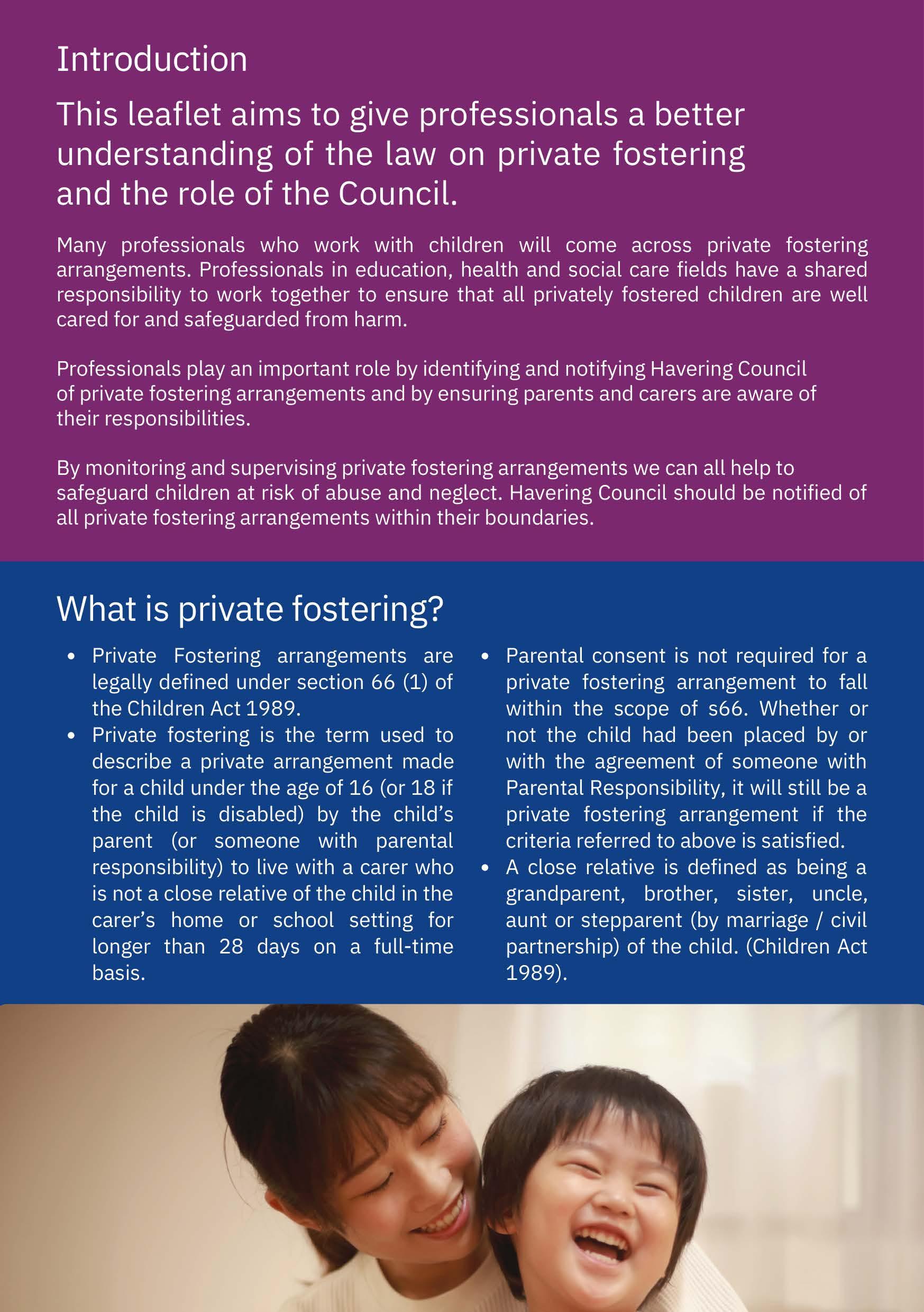

Common examples of private fostering can include
• Children / young people living with a friend's family because their parents are working or studying long and/ or anti-social hours.
• Children / young people sent to the UK for education (language schools, or those attending independent boarding schools who do not return home for the holidays) or for health care by birth parents who live overseas.
• Children / young people living with a friend's family as a result of parental separation, divorce or difficulties at home.
• Teenagers living with their partner's family.
• Unaccompanied asylum-seeking children who are living with friends , distant relatives or strangers
Privately fostered children are not children in the care of the local authority
Parents and private foster carers should notify the local authority.
• The Parent/s (or those with Parental Responsibility) and the private foster carer must by law notify the local authority of the name and address of the private foster carer, six weeks before the start of the private fostering arrangement.
• If the arrangement is already in place, they must notify the local authority at once. If the arrangement is made in an emergency and is intended to last more than 28 days, this information should be provided within 48 hours of the child being placed
• If this hasn ' t happened , please let the council know as they need a referral as a matter of urgency.
Partner agencies should notify the local authority

• Schools, other education settings and health settings play an essential role in identifying privately fostered children. In our different roles we may meet, talk to and complete forms with children, young people and their families . We may see children being taken to or collected from their education settings or health appointments by people other than their parents; or children may mention that they are staying with someone else as their parents have gone away for a long time
• It is good practice to ask questions about who lives in the household and who has parental responsibility, this can assist in helping to identify potential private fostering arrangements
• Child care professionals from all agencies (such as teachers , nursery workers or health care practitioners) have a duty to notify the local authority if they become aware of or believe that a child is living in a private fostering arrangement.
The role of the local authority and arrangements in Havering

• The Children Act 1989 places a legal duty on local authorities to protect and promote the welfare of privately fostered children, to check that the arrangements for the child/ren are safe and that the child/ren are well cared for.
• Section 44 of the Children Act 2004 extended these duties to include children who are proposed to be, but not yet, privately fostered. The duties are set out in the Children (Private Arrangements for Fostering) Regulations 2005.
Notification
It is important that all those who might come into contact with a privately fostered child undertake their duty to notify the local authority of these arrangements. In particular professionals working in the universal services of health and education have a pivotal role as they will often be the first to become aware of such arrangements.
These agencies share the local Councils responsibility for safeguarding and promoting the welfare of privately fostered children. Other agencies need to be aware that failure by a private foster carer or parent to notify a local authority of a private fostering arrangement is an offence and if local authorities are not aware of such arrangements they cannot carry out their duty to satisfy themselves that the welfare of the children concerned is being satisfactorily safeguarded.
arrangement
• An assessment Social Worker together with a Fostering Supervising Social Worker will undertake an initial private fostering Regulation 8 visit within seven working days of the date of the notification.
• The child should be seen at the placement and spoken to alone.
• The Assessment Social Worker will carry out a single assessment of the suitability of the arrangements for the child and the timescales involved in the arrangements.
• Once the arrangement is established a Social Worker will be allocated to the child and will visit the child every six weeks during the first year of the private fostering arrangement and then every 12 weeks thereafter.
Where the local authority is informed of a proposed or existing private fostering
Private Fostering

If you believe a child is being privately fostered please contact the Havering Council Multi Agency Safeguarding Hub (MASH).
Contact:
Havering Multi Agency Safeguarding Hub (MASH): Phone: Monday to Friday (9am to 5pm) 01708 433222
Out of hours/weekends 01708 433999
Email : tmash@havering.gov.uk
Refer on line: www.havering.gov.uk/privatefostering
Published 12 April 2023

A Haverinq www.havering.gov.uk/privatefostering •~ • LONDON BOROUGH






